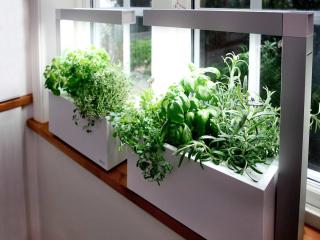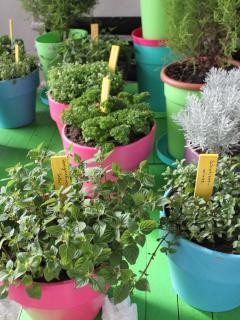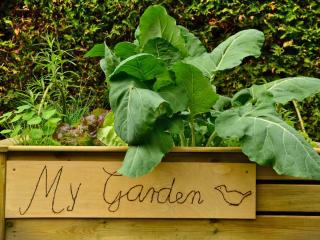

Herbs and spices are easy to grow and cook and it’s possible to squeeze them into any nook and cranny of the vegetable patch, flower bed and garden box.
The most important ones are showcased here.
→ Also: indoor herb & veggie tips
It is delicious with sauerkraut or salmon! Dill needs well drained soil and lots of sun. It propagates through seeds.
 Sow basil in a sheltered place in February-March, transplant directly in the ground mid-May.
Sow basil in a sheltered place in February-March, transplant directly in the ground mid-May.
Basil holds fertile and light soil dear along with sun and heat.
Its taste of young onion is irresistible! Chives prosper in fertile, cool and draining soil. It propagates through seeds and clump division.
Coriander provides an oriental touch of flavor to vegetable and meat dishes and mixed salads, too. Sow it directly in the ground. In summer, water it and protect it from the sun’s heat so the plant won’t go to seed.
Delicious with barbecues and fish, tarragon thrives in humus-rich and acidic soil. It reproduces through seeds or clump division. Cut the branches back to the base in fall.
Cooked and raw are the ways it is used in the kitchen. Just as happy in the sun as in the shade, parsley loves well-drained and fertile ground. The curly variety is particularly lush and beautiful.
Thyme appreciates sun and well-drained soil. Grow two to three plants to cover the needs of four people. It reproduces through seeds or cuttings prepared in summer. Cut it back in winter.
 Mint is the only spice together with lemon balm and chervil that favors shade: all others need lots of sun! Note that mint can quickly turn invasive. If you haven’t much space, best grow it in a pot. It propagates through clump division.
Mint is the only spice together with lemon balm and chervil that favors shade: all others need lots of sun! Note that mint can quickly turn invasive. If you haven’t much space, best grow it in a pot. It propagates through clump division.
Perfect for seasoning grilled food, marinades and tomato sauces, rosemary requires sun and cherishes dry soil. It reproduces through cuttings prepared in summer or through seed.
 Very useful in sauces and herbal tea, sage copes well with chalky soil.
Very useful in sauces and herbal tea, sage copes well with chalky soil.
It propagates through seeds and layering and must be cut back at the end of winter.
→ Ideal: set up an herb spiral
More herbs to consider: stevia, chervil, sichuan pepper, marjoram, hyssop…
Not only will you savor tasty meals, many herbs also help control pests, too!
For instance, sage, thyme and mint all help repel large white, a cabbage moth that wrecks havoc in the vegetable patch!